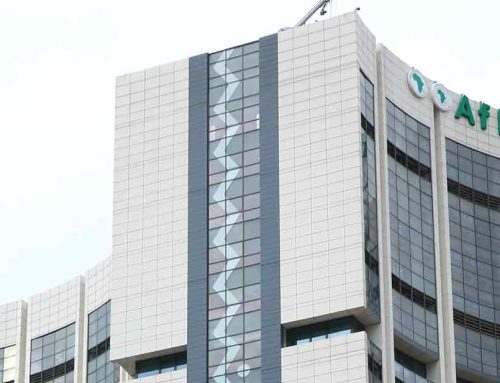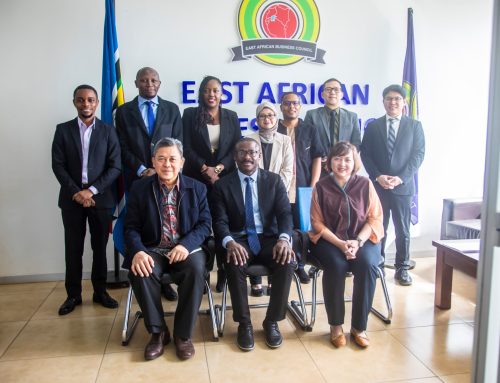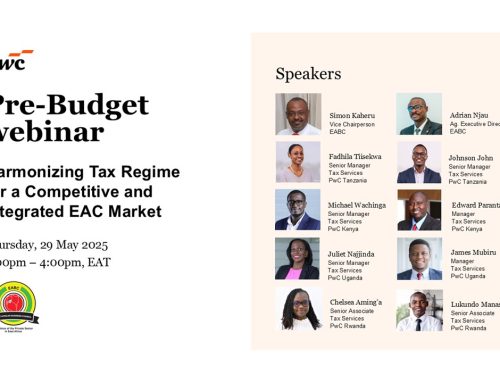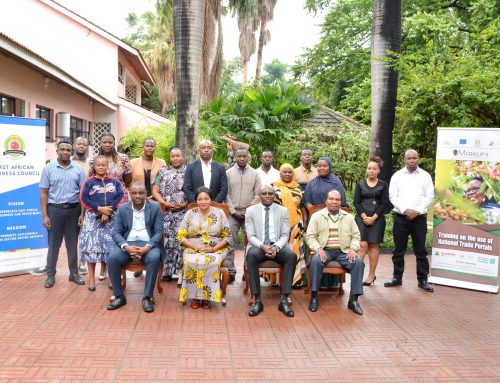1.0 INTRODUCTION:
The first case of COVID-19 was reported in East Africa in February 2019. So far, over 70 people have died of the disease, while more than 2,000 infected cases have been reported across the region. In an attempt to limit infections, Partner States have already put in measures to control the spread of the virus and imposed stricter restrictions.
The ongoing COVID-19 presents a significant challenge to EAC economies due to its strong links with the world economy in terms of trade, business and investment. EAC manufacturing with its current contribution of 9.7% to regional GDP with a projection of 25% by 2032 is one of the critical sectors that are being impacted by this pandemic in terms of sourcing of raw materials, intermediate & capital goods from countries that have been heavily hit by the outbreak of Covid19. In addition, EAC Partner States have come up with several measures in a bid to curb the outbreak of Covid-19 in the region and these are impacting sectors such as manufacturing. Some of these measures include lockdowns which have led to restrictions on the movement of persons and this affected labour supply to manufacturers, closure of businesses such as wholesale, retail, etc.
According to the World Economic Forum, the emergence of COVID-19 is accelerating the change of global value chain delivery models, with unprecedented consequences for manufacturers and supply chains. Mitigating the impact of COVID-19 on manufacturing and supply chains requires both new approaches and new forms of collaboration to increase overall resilience.
Given the impact of Covid19 on the manufacturing sector, EABC, therefore, organized a webinar to capture experts’ views and draw up recommendations that would inform policy at a regional level.
2.0 OBJECTIVE OF THE WEBINAR
The objectives of the webinar were to assess the impact of COVID-19 on the EAC Manufacturing sector, analyze its current state, what the pandemic could cause in both the short and long term, propose measures to mitigate the impact and come up a post covid19 recovery strategy.
3.0 PANELISTS/PARTICIPANTS
The high-level panelists for the webinar included; Hon. Christophe Bazivamo-EAC Deputy Secretary General Productive and Social Sectors, Dr. Stephen Kargbo-United Nations Industrial Development Organization (UNIDO) Representative in Tanzania, EAC and Mauritius, Mr. Dafa Frank-representing the Executive Director of Confederation of Tanzania Industries, Ms. Mary Ngechu-EABC Board Director representing Kenya Association of Manufacturers and Mr. Daniel Birungi, the Executive Director of Uganda Manufacturers Association.
Participants for the webinar were drawn from members of the EAC business community, EAC Secretariat, Development Partners and Public sector from across the region.
4.0 OPENING OF THE MEETING:
In his remarks, Mr. Stuart Mwesigwa, the EABC Board Director from Uganda and the official moderator of the webinar thanked the panelists for finding time to take part in the webinar and share their expert views on the impact of covid19 on the EAC manufacturing sector and the participants for their attendance.
However, he could not proceed with the meeting due to connectivity challenges and requested Mr. Lamech Wesonga from the EABC secretariat to stand in for him as the moderator.
5.0 KEY HIGHLIGHTS/OBSERVATIONS FROM THE DISCUSSIONS:
There has been a slowdown in the manufacturing sector as a result of inadequate inputs/raw materials previously imported from countries that have hugely been affected by COVID-19,
EAC manufacturing sector has harnessed the opportunities brought about by the COVID-19 pandemic through repurposing their production lines,
There is a need for the manufacturing sector to enhance their production capacities through producing substitute products that were initially being imported from outside the region,
It was observed that operational costs of manufacturing have increased as a result of low production and high labour cost as employers comply with health measures such as social distancing and acquiring Personal Protective Equipment (PPE),
Due to the outbreak of COVID-19 there has been the occurrence of Non-Tariff Barriers (NTBs) at EAC border posts such as Rusumo, Namanga, Malaba, Busia, etc due to restrictions on the movement of cargo and truck drivers imposed by the EAC Partner States as a result of complying to health guidelines,
Declining of imports and exports outside the EAC region- It was reported that one businessman who used to import 500 containers now imports about 300 containers monthly,
Manufacturers have repurposed some of their production lines to produce the much-needed essential items to fight covid19 such as sanitizers, face masks, and other PPEs,
Central banks in the regions have adopted various monetary measures aimed at increasing liquidity in the EAC economies. Such measures include lowering the Central Bank Rate (CBR) and Reducing the Cash Reserve Ration (CRR),
There is an EAC Regional Coordination Committee on COIVD-19 charged with coordinating various initiatives against COVID-19 in the region The Committee has so far developed a COVID19 response plan, coordinated a Joint Meeting of Ministers responsible for Health, Trade and EAC Affairs,
EAC Secretariat has developed Administrative Guidelines to facilitate the movement of goods and services during COVID19 pandemic which has eased the movement of goods in the region,
Through guidance from the Joint meeting of Ministers responsible for Health, Trade and EAC Affairs, focal points on COVID19 have been put in place in each Partner State,
To address the restrictions and long queues for truck drivers who are moving cargo across the borders, the region is coming up with a common health certificate with designated testing facilities,
EAC in collaboration with its partners trained Laboratory experts on COVID-19 laboratory diagnosis, procured mobile laboratories with test kits and distributed the same to the Partner States. Training will be extended to the staff of points of entry at airports and land borders,
Implementation of the EAC industrialization policy and strategy 2012-2032 will be affected by the COVID19 pandemic,
EAC secretariat has been able to mobilize some funds to support communities as a result of covid19. This fund will be coordinated by Red Cross and the Ministries of Health.
The manufacturing sector has been negatively impacted by the 20% reduction in household spending as a result of COVID19 across the region,
Globally, there has been a 30% fall in merchandise trade while six million people in the region are expected to drop further into poverty,
Globally three hundred million jobs could be lost as a result of COIVD19,
Disruptions in the supply chain are lessons to be learned on which type of models the region needs to chose especially on sourcing for raw materials and inputs,
It was observed that unfortunately, EAC imports 94% of its industrial inputs from outside the region, the trend which needs to be changed by manufacturers to start sourcing their inputs in the region,
Due to the impact of COVID-19, Africa is projected to enter into a recession and hence serious dialogue is needed,
There is a need to underscore diversification of industries and also increase value addition,
There is a need for the region to establish huge pharmaceutical base. This is meant to prepare against the occurrence of such pandemics,
SMEs in the region operate with low production capacities, not automated and have been affected by; an increase in the price of raw materials, failure to sustain the workforce, loss of market, curfews which have led to reduced working hours.
Many SMEs have also repurposed some of their production lines to manufacture essential products needed in the fight against covid19.
Some SMEs have ventured into online platforms to market their products.
6.0 RECOMMENDATIONS FROM THE WEBINAR
Through a coordinated approach, EAC Partner States to urgently address Non-Tariff Barriers (NTBs) related to COVID-19 to enable Manufacturers to access regional markets. This will substantially address among other costs those attributed to the relay driving by truck drivers and costs of escorting cargo to final destinations.
Fast track payment of VAT refunds to ensure that manufacturers address cash flow constraints and remain afloat
EAC Partner States to reduce Value Added Tax to spur consumption of locally produced goods.
Promote the consumption of locally manufactured products in the region through Public Procurement.
EAC Partner States to come up with post COVID19 stimulus packages for the industrial sector. This is to cushion against the losses incurred as a result of covid19. One such cost is those attributed to repurposing production lines to produce the much-needed essential products.
Focus should be put on local production and reviewing the necessary policies geared towards the promotion of locally manufactured products, where local means the EAC region. One such instrument can be Buy East Build Africa (BEABEA).
EAC Partner States to defer payment of taxes such as VAT on imported raw materials and machinery.
EAC Partner States need to limit new measures on COVID19 that could negatively impact on the businesses.
Partner States should lower the Central Bank Rate (CBR) and reduce the Cash Reserve Ratio (CRR) so that commercial banks have the necessary liquidity to lend to businesses at favorable rates.
Advocate for industrial policy-making that supports infrastructure development. EAC can learn from UNIDO’s instruments.
EAC Partner States should focus on import substitution in order to avoid overreliance on imports.
There is a need to call on the International community to increase the financial space. This includes debt relief. At the AU level, envoys have been appointed to fast track this process.
Governments should expand on their local sourcing to boost the manufacturing sector in the region.
Partner States should set up an emergency rescue fund on covid19 specific to SMEs.
There should be awareness creation for SMEs on available opportunities.
EAC Partner States need to re-evaluate their tax reliefs ie Zero-rating VAT on essential products.
Partner States which are charging for covid19 tests should consider subsidizing the cost of testing employees for SMEs.
EAC Partner States should adopt Moratorium on charges of taxes as well as repayment of loans during the period of COVID-19
Business linkages should be created between large manufacturers and Small and Medium Enterprises (SMEs). This can be achieved through contract manufacturing.
E-commerce needs to be promoted through support to SMEs as they lack digital marketing skills and strategy as well as data analysis.
Improve the whole eco-system of e-commerce at the regional and international levels.
Improve regulatory compliance on e-commerce. This can be through awareness creation.
There is a need for increased awareness on covid19 and the threat it poses to the economies of the EAC Partner States.
The region should embark on building a strong industrial base to cushion against the effects of such pandemics as covid19. This calls for an assessment of all products being imported from outside the region. This will make the region self-sufficient in terms of manufactured products. Policies such as Build East Africa Buy East Africa should be fast-tracked.
END





